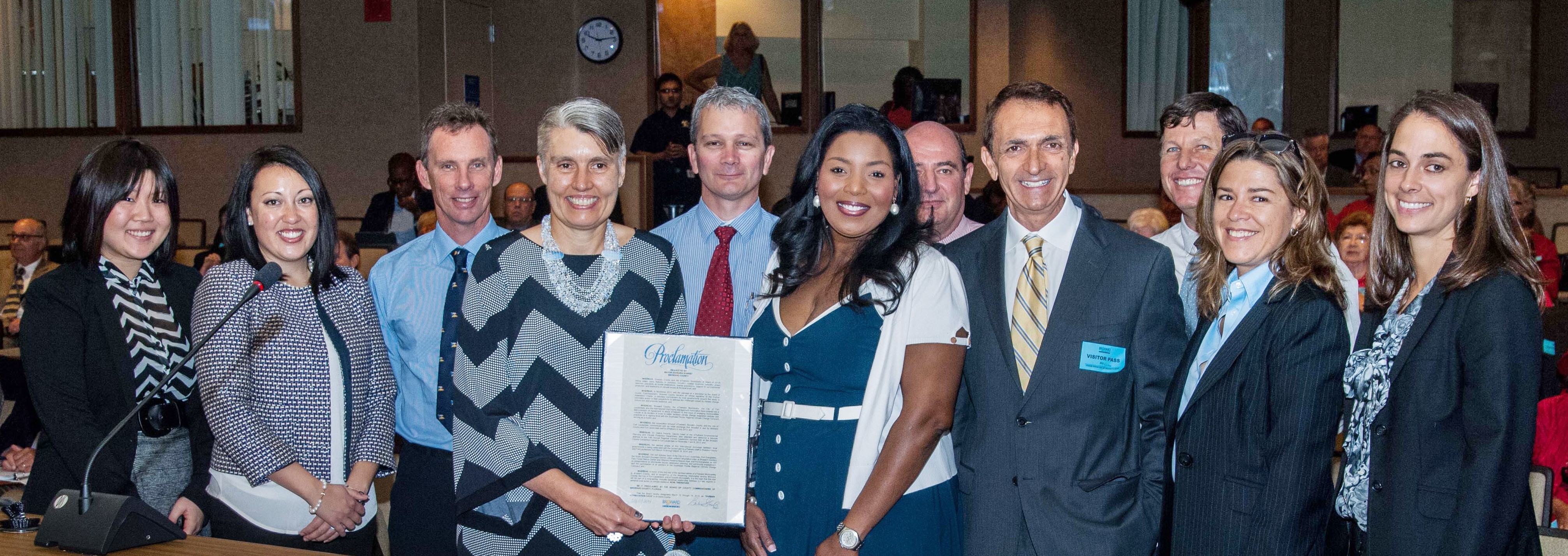
Since 2013, Durban, South Africa; Broward County, and Fort Lauderdale, Florida, have collaborated through the CityLinks Durban/Southeast Florida Climate Change Partnership focusing on climate change issues. As a continuation of this partnership, five Durban representatives traveled to southeast Florida in March for a week-long visit to learn more about the strategies Floridians have applied to protect their communities from the effects of climate change.
During the exchange, the visitors took an in-depth look at the technical and policy solutions Fort Lauderdale and Broward County are implementing to address climate change. Particularly interested in the governance model of the Southeast Florida Regional Climate Compact, the delegation met with key community members who were integral to its formation. Discussions and site visits throughout the week addressed flooding, storm water management solutions, ecosystem restoration, coastline management, and public/private sector engagement.
Durban is the third-largest metropolitan city in South Africa, and its extensive beaches draw in tourists from all over the world. However, being a coastal municipality has its drawbacks; Durban is highly susceptible to the impacts of climate change. Situated on the southeast coast of Florida, Broward County and Fort Lauderdale face similar challenges to Durban, including sea level rise, flooding, and storm water management. As members of the Southeast Florida Regional Climate Compact, the two jurisdictions have dedicated significant time to implementing climate mitigation and adaptation strategies to protect their communities. The Compact was formed in 2009 when Broward, Miami-Dade, Monroe, and Palm Beach counties vowed to work cooperatively in their efforts to adapt to climate change.
Last summer, CityLinks, a program funded by the U.S. Agency for International Development and designed to facilitate global, municipal partnerships, arranged for Fort Lauderdale’s Assistant City Manager Susanne Torriente and Broward County’s Director of the Natural Resources Planning and Management Division Dr. Jennifer Jurado to visit Durban, to learn more about climate issues there. During the week they discussed the benefits and challenges of working across jurisdictions to implement adaptive measures at a regional level. The recent exchange in March allowed Durban delegates to see the successful outcomes of the Compact and learn more about strategic regional cooperation and the significance of citizen engagement.
The Durban delegation, composed of employees from the Environmental Planning and Climate Protection Department of eThekwini Municipality, was led by Dr. Debra Roberts, deputy head of the department. Catchment manager Geoffrey Tooley, Climate Protection Branch manager Dr. Sean O’Donoghue, Coastal Policy Project executive Andrew Mather, and Biodiversity Planning manager Richard Boon also participated in the exchange.
The week was packed with a tour of Fort Lauderdale, Broward County, Port Everglades, Everglades Holiday Park, visits to environmental restoration sites and drainage facilities, and meetings with city and county officials and the Compact’s staff steering committee. Fort Lauderdale Mayor John P. Seiler commented, “We are honored to host the city of Durban for this historic visit, and we value this opportunity to share information and formulate strategies on how to best address and mitigate the impacts of climate change. We look forward to raising the dialogue as we continue to work together to identify innovative, transformative solutions to strengthen our resiliency and ensure the long-term sustainability and prosperity of our collective communities.”
Broward County also expressed enthusiasm for the city-to-city exchange and named the days from March 10-14 as “Durban Appreciation Days.” “Broward County has proven that regional cooperation is effective in planning for climate change. This is an approach that can be shared worldwide, and we are extremely pleased to be working with Durban to help them develop regional approaches to climate preparedness and community resilience,” said Broward County Mayor Barbara Sharief. “We hope and expect this visit is just the beginning of a long relationship between our two regions.”
To learn more about ICMA’s work in Durban and the CityLinks program, visit the CityLinks website and the Notes from CityLinks blog, follow us on Twitter at @ICMACityLinks, like us on Facebook, and join the climate change discussion in the Climate Preparedness, Adaptation, and Resilience group on the Knowledge Network. Visit ICMA International’s site for additional information on ICMA’s other global projects.
New, Reduced Membership Dues
A new, reduced dues rate is available for CAOs/ACAOs, along with additional discounts for those in smaller communities, has been implemented. Learn more and be sure to join or renew today!
